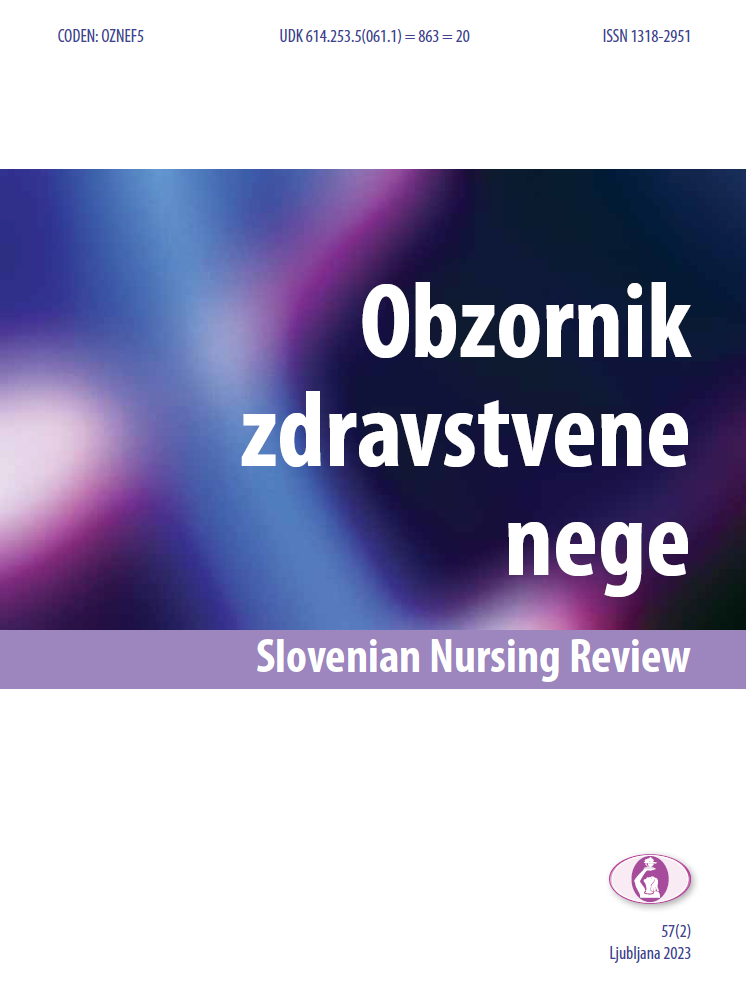Etična občutljivost študentov zdravstvene nege
opisna raziskava
DOI:
https://doi.org/10.14528/snr.2023.57.2.3171Ključne besede:
etične dileme, dodiplomski študij, sekundarna socializacija, profesionalne vrednote, zdravstvena negaPovzetek
Uvod: Etična občutljivost je pomemben dejavnik pri zagotavljanju kakovostne zdravstvene oskrbe. Namen raziskave je bil preučiti etično občutljivost študentov zdravstvene nege.
Metode: Uporabljena je bila kvantitativna metodologija raziskovanja z metodo anketiranja. Anketiranje je potekalo na priložnostnem vzorcu 126 dodiplomskih študentov zdravstvene nege. Podatki so bili zbrani na podlagi prevedenega in prilagojenega »Vprašalnika za merjenje etične občutljivosti med študenti zdravstvene nege« (ang. Ethical Sensitivity Questionnaire for Nursing Students). Za statistično analizo so bile uporabljene naslednje metode: osnovna deskriptivna statistika ter neparametrični Mann-Whitneyjev U-test in Kruskal- Wallisov H-test.
Rezultati: Rezultat notranje konsistentnosti za celoten vprašalnik je pokazal dobro stopnjo zanesljivosti (Cronbach α = 0,711). Anketirani študenti zdravstvene nege na dodiplomskem študiju so prikazali zmerno stopnjo etične občutljivosti ( 
Diskusija in zaključek: Ugotovljeno je bilo, da obstajajo možnosti za izboljšanje etične občutljivosti študentov zdravstvene nege. Na podlagi ugotovitev so potrebne nadaljnje raziskave o etični občutljivosti v povezavi z delovno otopelostjo v zdravstvenem sistemu. Smiselno bi bilo raziskati tudi dejavnike, ki vplivajo na etično občutljivost in primerjati etično občutljivost med študenti zdravstvene nege in zaposlenimi medicinskimi sestrami.
Prenosi
Metrike
Literatura
Al-Kateeb, B. A., Raqqad, F., Shamayleh, N., Zainelabdin, F. A., & Masri, A. A. (2021). The level of ethical sensitivity among jordanian university students according to their educational level & specialization. Journal of Education and E-Learning Research, 8(4), 385–394. https://doi.org/10.20448/journal.509.2021.84.385.394
Abdu Alnajjar, H., & Aly Abou Hashish, E., (2021). Academic ethical awareness and moral sensitivity of undergraduate nursing students: Assessment and influencing factors. SAGE Open Nursing, 2021, Article 7. https://doi.org/10.1177/23779608211026715 PMid:34263030; PMCid:PMC8243134
Baghaei, R., Moradi, Y., Aminolshareh, S., & Zareh, H. (2014). The ethical sensitivity of nurses in decision making in Ayatollah Taleghani hospital. Journal of Urmia Nursing And Midwifery Faculty, 11(11).
Borhani, F., Abbaszadeh, A., & Mohsenpour, M. (2013). Nursing students' understanding of factors influencing ethical sensitivity: A qualitative study. Iranian Journal of Nursing and Midwifery Research, 18(4), 310–315.
Borhani, F., Alhani, F., Mohammadi, E., & Abbaszadeh, A. (2010). Professional ethical competence in nursing: The role of nursing instructors. Journal of Medical Ethics and History of Medicine, 3(3). Cetinkaya, B. (2020). Ethics in the curriculum of undergraduate nursing programs in Turkey. International Archives of Nursing and Health Care, 6(1). https://doi.org/10.23937/2469-5823/1510141
Cho, O.-H., & Hwang, K.-H. (2019). Academic ethical awareness among undergraduate nursing students. Nursing Ethics, 26(3), 833–844. https://doi.org/10.1177/0969733017727155 PMid:28893158
Choi, J. (2019). Cheating behaviors and related factors at a Korean dental school. Korean Journal of Medical Education, 31(3), 239–249. https://doi.org/10.3946/kjme.2019.134 PMid:31455053; PMCid:PMC6715897
Dinmohammadi, M., Peyrovi, H., & Mehrdad, N. (2013). Concept analysis of professional socialization in nursing. Nursing Forum, 48(1), 26–34. https://doi.org/10.1111/nuf.12006 PMid:23379393
Hakbilen, H., İnce, S., & Ozgonul, M. L. (2021). Ethical sensitivity of nursing students during a 4-year nursing curriculum in Turkey. Journal of Academic Ethics, 21, 41–51. https://doi.org/10.1007/s10805-021-09432-2
Kodeks etike v zdravstveni negi in oskrbi Slovenije in Kodeks etike za babice Slovenije. (2014). Ljubljana: Zbornica zdravstvene in babiške nege Slovenije – Zveza strokovnih društev medicinskih sester, babic in zdravstvenih tehnikov Slovenije
Kucukkelepce, G. E., Dinc, L., & Elcin, M. (2020). Effects of using standardized patients on nursing students' moral skills. Nursing Ethics, 27(7), 1587–1602. https://doi.org/10.1177/0969733020935954 PMid:32729761
Macale, L., Scialo, G., Masi, P., Rocco, G., Stievano, A., Vellone, E., & Alvaro, R. (2016). Development of the ethical sensitivity scale in undergraduate nursing students. Professioni Infermieristiche, 68, 244–250.
Muramatsu, T., Nakamura, M., Okada, E., Katayama, H., & Ojima, T. (2019). The development and validation of the ethical sensitivity questionnaire for nursing students. BMC Medical Education, 19(1), 215. https://doi.org/10.1186/s12909-019-1625-8 PMid:31208409; PMCid:PMC6580574
Ovijač, D. (2012). Medpoklicno sodelovanje in etika v zdravstvu. Obzornik zdravstvene nege, 46(4), 297–301. Retrieved December 3, 2021 from https://obzornik.zbornicazveza.si/index.php/ObzorZdravNeg/article/view/2896
Salar, A. R., Zare, S., & Sharifzadeh, E. (2016). The survey of nursing students ethical sensitivity. Biology and Medicine, 8, Article 5. https://doi.org/ 10.4172/0974-8369.1000311
Saunders, M., Lewis, P., & Thornhill, A. (2009). Research Methods for Business Students. Pearson Education.
Shayestehfard, M., Torabizadeh, C., Gholamzadeh, S., & Ebadi, A. (2020). Ethical sensitivity in nursing students: Developing a context–based education. Electronic Journal of General Medicine, 17(2), Article em195. https://doi.org/10.29333/ejgm/7812
Taber, K. S. (2018). The use of cronbach's alpha when developing and reporting research instruments in science education. Research in Science Education, 48(6), 1273–1296. https://doi.org/10.1007/s11165-016-9602-2
Tanaka, M., & Tezuka, S. (2021). A scoping review of alternative methods of delivering ethics education in nursing. Nursing Open, 9(6), 2572–2585. https://doi.org/10.1002/nop2.987 PMid:34255926
Tas Arslan, F., & Calpbinici, P. (2018). Moral sensitivity, ethical experiences and related factors of pediatric nurses: A crosssectional, correlational study. Acta bioethica, 24(1), 9–18. https://doi.org/10.4067/S1726-569X2018000100009
Tuvesson, H., & Lutzen, K. (2017). Demographic factors associated with moral sensitivity among nursing students. Nursing Ethics, 24(7), 847-855. https://doi.org/10.1177/0969733015626602 PMid:26826120
Webster, A., Bowron, C., Maich, N., & Patterson, P. (2016). The effect of nursing staff on student learning in the clinical setting. Nursing Standard, 30, 40–47. https://doi.org/10.7748/ns.30.40.40.s44 PMid:27275914
World Health Organization (WHO). (2020). Process of translation and adaptation of instruments. Retrieved December 3, 2021 from https://www.who.int/substance_abuse/research_tools/translation/en/
World Medical Association. (2013). World Medical Association Declaration of Helsinki: Ethical principles for medical research involving human subjects. Journal of the American Medical Association, 310(20), 2191–2194. https://doi.org/10.1001/jama.2013.281053 PMid:24141714
Prenosi
Objavljeno
Kako citirati
Številka
Rubrike
Licenca
Avtorske pravice (c) 2023 Obzornik zdravstvene nege

To delo je licencirano pod Creative Commons Priznanje avtorstva 4.0 mednarodno licenco.
Na Obzornik zdravstvene nege, Ob železnici 30A, 1000 Ljubljana, prenašam naslednje materialne avtorske pravice: pravico reproduciranja v neomejeni količini, in sicer v vseh poznanih oblikah reproduciranja, kar obsega tudi pravico shranitve in reproduciranja v kakršnikoli elektronski obliki (23. čl. Zakona o avtorski in sorodnih pravicah – v nadaljevanju ZASP); pravico distribuiranja (24. čl. ZASP); pravico dajanja na voljo javnosti vključno z dajanjem na voljo javnosti prek svetovnega spleta oz. računalniške mreže (32.a čl. ZASP); pravico predelave, zlasti za namen prevoda (33. čl. ZASP). Prenos pravic velja za članek v celoti (vključno s slikami, razpredelnicami in morebitnimi prilogami). Prenos je izključen ter prostorsko in časovno neomejen.
























